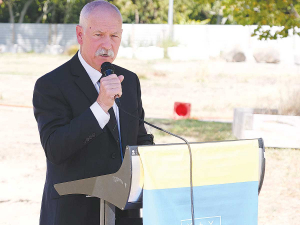Wired for Science: Understanding the feeding habits of mealybug
Fussy children might be frustrating, but fussy mealybugs could help protect the New Zealand wine industry from grapevine leafroll-associated virus 3.
 Lincoln University acting vice-chancellor Professor Bruce McKenzie speaking at the soil turning ceremony.
Lincoln University acting vice-chancellor Professor Bruce McKenzie speaking at the soil turning ceremony.
A new flagship science facility for Lincoln University is further proof of its growing world reputation, claims acting vice chancellor Professor Bruce McKenzie.
He says Lincoln’s significant growth in domestic student numbers, clear government support and a raised awareness of the importance of the agritech industry to New Zealand’s economic development have all factored into its increased profile as a world-ranked land-based university.
Late last month, a ceremony was held to break the first ground of Lincoln’s new science facility. McKenzie says this capped off a ten-year journey for Lincoln, beginning with the Canterbury earthquakes in 2010/11 and concluding with formal Government approval for the construction of the new facility.
“Lincoln University has been producing primary sector graduates for more than 140 years and we remain dedicated to equipping coming generations with the knowledge and skills needed to grow a better future,” he explained.
“It’s only appropriate that we deliver our world-leading education and research from a science facility built for the ages.”
McKenzie says the official government approval, confirmed by Education Minister Hon Chris Hipkins and Finance Minister Hon Grant Robertson in September 2020, reflected the government’s support for Lincoln University and signalled the important role it continues to play in shaping a more productive and sustainable future for New Zealand.
“Our university has always been a chief driver of innovation in the agritech sector, particularly in the food and fibre industries,” he says.
“Our new facilities will position us to take an even more prominent role in developing solutions for the world’s most pressing environmental challenges.”
McKenzie said the fundamental change brought by COVID-19 across many sectors of New Zealand’s agriculture industry in the last 12 months has triggered a steeply rising demand for tertiary education in the land-based sciences.
“Lincoln University, as a globally-ranked land-based university, is strategically placed to capitalise on increased demand for agricultural qualifications from both students and employers,” he added.
“While our international enrolments have predictably declined due to the pandemic, our domestic student numbers have grown significantly.
McKenzie says new domestic undergraduate student enrolments are up 33% on the same time last year, with a record 344% increase for new domestic postgraduate students.
Construction on the new building begins this month and is expected to be completed in mid- 2023. The fit-for-future science facility will feature state-of-the-art teaching, research and collaboration spaces complemented by multi-use adjustable workstations and social zones, all set within a regenerative and bio-diverse park-like environment.
The new flagship science building will have a minimal environmental impact, incorporating roof-mounted and wall-mounted solar arrays, a ground-sourced air conditioning system and a rainwater-fed bathroom flushing system in its design.
Lincoln University is the only New Zealand university to achieve a ranking on the UI Green Metric World University Rankings, currently ranked 51 out of 912 universities.
The new science facilities are part of a wider campus development programme for Lincoln that has already seen the launch of a new student hub and outdoor events space featuring native plantings and a cultural heritage-inspired paved pathway.
The redeveloped LU Gym will offer significantly enhanced fitness, training and wellbeing support to the Lincoln community on its completion within the next several weeks.
Further campus projects including a decarbonisation programme and to cease the combustion of coal by 2024, the restoration of Ivey West and Memorial Hall and an overarching landscaping masterplan, which are all in various stages of development.
The Push-Up Challenge, an event which combines mental health and fitness, is set to launch in New Zealand in 2026.
Last month's Agritechnica event led to a wide group of manufacturers celebrating successes when the 2026 Tractor of the Year Competition winners, selected by a panel of European journalists, were announced in Hanover Germany.
According to the latest Federated Farmers banking survey, farmers are more satisfied with their bank and less under pressure, however, the sector is well short of confidence levels seen last decade.
Farmer confidence has taken a slight dip according to the final Rabobank rural confidence survey for the year.
Former Agriculture Minister and Otaki farmer Nathan Guy has been appointed New Zealand’s Special Agricultural Trade Envoy (SATE).
Fonterra has slashed another 50c off its milk price forecast as global milk flows shows no sign of easing.